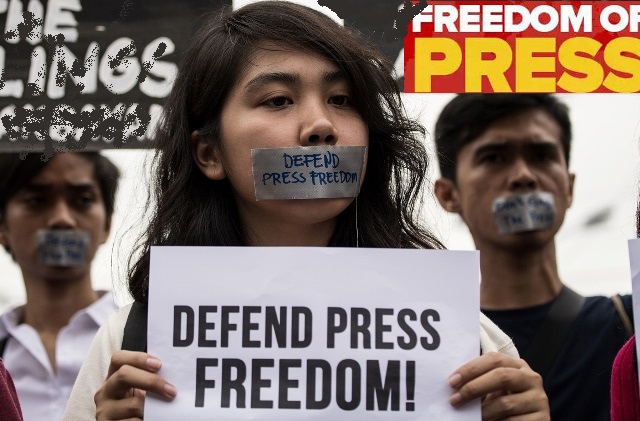
Pegasus and Beyond: Press Freedom at Stake
As a rogue religious fanatic stood outside Jamia Milia Islamia, gun pointed towards students, a Danish Siddiqui stood in his direct range to get the perfect shot. He wanted to document a story from the point closest to action. He told the Guardian once, “I shoot for the common man who wants to see and feel a story from a place where he can’t be present himself.”
Siddiqui is not alone. Often in crisis situations when the world runs away from a threat, journalists run towards it. Such madness. Such risks. Such passion. Consequently, when some don’t live to tell their stories, others take up their cause.
However, in the recent years a pattern has been observed – a rise in right-wing populist nationalism across the globe and an increase in intolerance towards freedom of speech and expression.
The last decade, in particular, has been chilling for the profession. In 2018, Jamal Khashoggi went to the Saudi Consulate in Istanbul, to never come out. Prince Mohammed Bin Salman told Bloomberg News that Khashoggi had left. It can safely be said that Khashoggi’s wife, who was waiting for him right outside, would disagree.
Allegedly, the currently infamous Pegasus spyware had a role to play. NSO (the company that owns the spyware) denies its use even as it says it doesn’t keep a list of targets – current and potential. How does one wrap their head around such conflicting statements?
Worldwide, 937 journalists have been killed in ten years. About 50 were killed in 2020 and 54 held as hostage in the same year. Some are missing. While journalists have been killed in cold blood, arrested for speaking out inconvenient truths and spied upon for decades now (maybe since the start of the trade), let’s not for one second feel that it is a normal order of the world – whatever it is that we are seeing right now, a lot of which is coming from conservative/right-wing populist and hyper-nationalist countries.
In Singapore, as the conservative centre-right party continues to rule, the “Switzerland of the East” has been painted black on the map of World Press Freedom Index. Journalists are sued left, right and centre and defamation suits are the order of the day. The cherry on the cake? Citizen Lab, the academic research lab that focuses on global security, human rights and communication technologies, found Pegasus infections here.
ALSO READ: Pegasus, What’s New About It!
The international organization protecting the right to freedom of information, Reporters Without Borders, says that this city-state is not far-off from China when it comes to suppression of Press. Self-censorship prevails and government decides what is incorrect in News. Words like democracy, press freedom, independence come to mind but not in a positive way.
Moving on. The United Kingdom, currently governed by the Conservative party, is considering changes to the Official Secrets Act of 1989 that could lead journalists reporting on matters that embarrass the government to be imprisoned for up to 14 years.
Now, some would say that the core of journalism hinges on holding the government to account. The Home Office told the National that reporters would remain free to do so but it’s not yet clear how. The National Union of Journalists has responded with a staunch opposition, some calling it “actual fascism”.
But fascism comes in all shapes and sizes. Sometimes it looks like a friend. Technology, for instance, has created immense sophistication in our lives. There is so much to be thankful for. But some of it is operating on legal and ethical boundaries of personal freedom and private lives and some of it has crossed those boundaries. Pegasus belongs to the latter category.
After the Pegasus scandal erupted, BBC reported that about 50 countries could be clients to NSO, the firm behind the spyware that can collect some of the most personal and private information of people it snoops upon.
It’s critical here to understand that its commonness does not make it ok for it to be used world over. It should become more alarming. The fact that there is a community killed, mutilated, and treated as dispensable and that it has been handling spyware attacks at the same time because it is so common is not ok. What’s needed is support for it to thrive and not vile programs used by vile governments for vile purposes.
This very community in its varied image (good, bad, and ugly) is a major pillar of any democracy. Snooping, especially, at the level that the Pegasus operates on – the excessive and unaccountable surveillance – is antithetical to the essence of democracy and to the spirit of journalism.
While some governments can use surveillance for national security, at one point it must show prosecutions that show actual breach of this security or an attempt to justify such action. It cannot be a “snoop till eternity and without any basis”.
ALSO READ: Press Freedom In India Is A Myth
However, in India, the Pegasus scandal does not exist in a vacuum. There is a context to overall downgrading of press freedom. In 2020, India had slipped nine points in the press freedom index from 133 in 2016. That’s nine points in four years. Among 180 countries, we now stand at 142.
Our close neighbour Pakistan, which is ruled by a “centrist”, Islamist and populist party, ranks 145. It is also in the list of countries where infections associated with Pegasus operators have been found.
In India, though, the blow on this fourth pillar of democracy and subsequent fall in press freedom ranking is not in a vacuum. The assault on democracy has been duly noted and in the annual democracy index published by the Economist Intelligence Unit in 2020, India slipped two places down.
What looks like a mere journalism problem to the world right now might be a bigger democratic problem and now would be a good time to focus on this deepening crisis of freedom of speech, overreach of power and sustained assault on a major institution defining some of the most influential global powers.
At home, we need the fix the Pegasus issue. Our government must come clean. Did they buy Pegasus? Did they use it? Yes or no, with or without proper authorization? It is confusing for the common man to understand why a government would not do it already but give logically erroneous responses like other countries do it too, it’s an attempt to derail the data protection bill (oddly!), and how our surveillance is never illegal (help us believe it?).
To wrap up, the list of countries with populist governments leaning to the right and allegedly using Pegasus is not as short as some would like. The declining press freedom in most of these nations is concerning. The relationship needs to be examined. But, before we root for an Orwellian world, knowing what’s at stake might only be proper. 1984, anyone?



